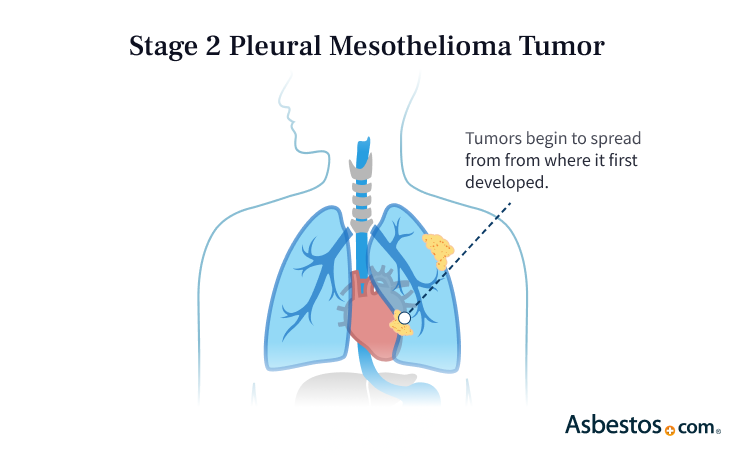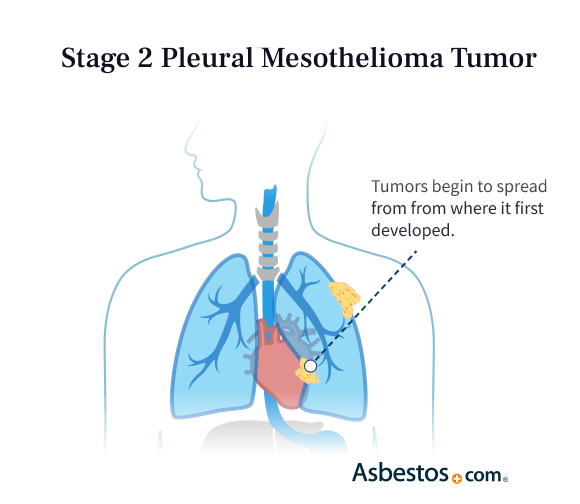Based on Your Reading:
Get Your Free Mesothelioma Guide

Find a Top Mesothelioma Doctor

Access Help Paying for Treatment

Stage 2 mesothelioma is an early cancer stage when cancer cells may not have spread far but are entering nearby lymph nodes. Stage 2 prognosis may still be favorable, and many treatments are available to extend life expectancy. The 2-year survival rate for patients at this stage is around 38%.
Written by Karen Selby, RN • Edited By Walter Pacheco • Medically Reviewed By Dr. Jacques Fontaine
The Mesothelioma Center at Asbestos.com has provided patients and their loved ones the most updated and reliable information on mesothelioma and asbestos exposure since 2006.
Our team of Patient Advocates includes a medical doctor, a registered nurse, health services administrators, veterans, VA-accredited Claims Agents, an oncology patient navigator and hospice care expert. Their combined expertise means we help any mesothelioma patient or loved one through every step of their cancer journey.
More than 30 contributors, including mesothelioma doctors, survivors, health care professionals and other experts, have peer-reviewed our website and written unique research-driven articles to ensure you get the highest-quality medical and health information.
My family has only the highest compliment for the assistance and support that we received from The Mesothelioma Center. This is a staff of compassionate and knowledgeable individuals who respect what your family is experiencing and who go the extra mile to make an unfortunate diagnosis less stressful. Information and assistance were provided by The Mesothelioma Center at no cost to our family.LashawnMesothelioma patient’s daughter


Selby, K. (2024, May 2). Stage 2 Mesothelioma. Asbestos.com. Retrieved May 6, 2024, from https://www.asbestos.com/mesothelioma/stage-2/
Selby, Karen. "Stage 2 Mesothelioma." Asbestos.com, 2 May 2024, https://www.asbestos.com/mesothelioma/stage-2/.
Selby, Karen. "Stage 2 Mesothelioma." Asbestos.com. Last modified May 2, 2024. https://www.asbestos.com/mesothelioma/stage-2/.
Stage 2 mesothelioma is a diagnosis that means cancer has spread outside the original location. Tumors involve deep tissue near the original site and may invade nearby lymph nodes, such as hilar lymph nodes. These lymph nodes, also known as N1 lymph nodes, are located at the root of the lung.
The stages of the disease progress from stage 1 to stage 4. Stages 1 and 2 are considered early-stage mesothelioma.
Peritoneal mesothelioma has no formal staging system. Doctors often define peritoneal mesothelioma as stage 2 if there is local tumor growth that involves the lymph nodes. The main difference between stage 2 and stage 1 disease is tumor cells in the hilar lymph nodes.


In stage 1, cancer cells have not yet reached any lymph nodes. Tumors in stage 2 may or may not have grown into the diaphragm or the lung tissue. Stage 2 mesothelioma patients who are otherwise healthy may be able to endure an aggressive treatment plan.
In most cases, mesothelioma symptoms are not present in stage 2. When people do notice symptoms, they are typically minor. Symptoms may be mistaken as signs of a less severe illness, such as flu, pneumonia or bronchitis.
Tumor growth or a fluid buildup in the pleura may cause pain and other symptoms as the lungs constrict. These symptoms become more frequent with stage 3 or stage 4 disease.
Get Your Free Mesothelioma Guide

Find a Top Mesothelioma Doctor

Access Help Paying for Treatment

Stage 2 mesothelioma is challenging to diagnose because it has a long latency period. Decades pass between initial asbestos exposure and cancer development. Once tumors develop, they can multiply without causing symptoms until stages 3 or 4.
5%
Percentage of respondents to The Mesothelioma Center’s 2023 patient survey who were diagnosed with stage 2 mesothelioma.
While only 11% of respondents in our survey were diagnosed with stage 1 or 2 mesothelioma (early stage), 40% were diagnosed with stage 3 or 4 (late stage). Doctors most often diagnose mesothelioma cases after the cancer has already spread beyond stage 2. Sometimes, they may recognize it sooner.
Cancer screenings identify some stage 2 cases. Doctors often find mesothelioma when checking a patient’s chest for an unrelated reason such as chest pains, chronic cough or other chest conditions.
Median life expectancy for stage 2 mesothelioma patients is 1 to 2 years. About 38% of stage 2 mesothelioma patients survive for at least 2 years, and 11% live for 5 years or more. Survival rates reveal the seriousness of this diagnosis, but they cannot predict the outcome for an individual patient.
Related Videos:
Each mesothelioma patient’s life expectancy depends on many factors. Their overall health and the specific cancer cell type are essential in determining treatment options and effectiveness. Patients with stage 2 peritoneal mesothelioma tend to have better survival rates than patients with pleural disease.
The American Cancer Society explains, “People now diagnosed with mesothelioma may have a better outlook than these numbers show. Treatments improve over time, and these numbers are based on people diagnosed and treated at least five years earlier.”
Cheryl Pilkington was fortunate to be diagnosed with mesothelioma in stage 2, which is earlier and more treatable than when most patients are diagnosed. Pilkington underwent aggressive pleurectomy and decortication surgery at Winthrop P. Rockefeller Cancer Institute in Little Rock, Arkansas, under the care of thoracic surgeon Dr. Matthew Steliga.
Stage 2 mesothelioma treatment options include chemotherapy, immunotherapy, surgery and radiation. Doctors also use multimodal therapy, which is a combination of treatments.
The best combination of treatments will differ for each patient. Many physicians recommend an approach that includes surgery, chemotherapy and radiation for pleural and peritoneal mesothelioma patients.
A 2022 study on pleural mesothelioma patients at stages 1 and 2 found multimodal therapy safe and effective at improving survival. Participants underwent induction chemotherapy, surgery, postoperative radiation therapy and chemotherapy.
Researchers reported a median overall survival of 32.1 months. That figure surpassed the average 12-month survival. Clinical trials also offer experimental treatments such as immunotherapy.
Unfortunately, no stage of mesothelioma is curable. However, therapies can control the cancer to help people live longer with mesothelioma. In our 2023 survey, 10% of pleural patients and 21% of peritoneal patients said they had experienced remission.
Pleural mesothelioma is an aggressive disease. Most patients do not survive longer than 2 years after diagnosis. Stage 2 mesothelioma has a better prognosis than more advanced stages of the cancer. New drugs and treatment approaches are helping patients manage this cancer as a chronic disease rather than a terminal illness.
Patients with stage 2 peritoneal mesothelioma may be eligible for surgery. They may also qualify for hyperthermic intraperitoneal chemotherapy. This treatment is also known as HIPEC. About 50% of peritoneal patients who receive HIPEC will be alive five years after diagnosis.

The prognosis for stage 2 mesothelioma maybe favorable. However, because this is an aggressive cancer, most patients live for 1 to 2 years after diagnosis.
Doctors consider stage 2 mesothelioma as an early-stage disease and more eligible for curative treatments such as surgery, immunotherapy and chemotherapy. Curative treatments are therapeutic options that can extend survival.
A multimodal treatment approach is the most common and effective therapeutic option for most stage 2 mesothelioma patients. Physicians often take a multimodal approach and use multiple therapies, such as surgery and chemotherapy, to decrease the chance of cancer recurrence.
Some screening tests, such as chest X-rays, CT scans and PET scans, can detect the presence of early-stage mesothelioma before symptoms develop. If you have a known history of asbestos exposure, informing your health care team will ensure you receive screening for mesothelioma and other asbestos-related diseases.

Have a question? Contact one of our Patient Advocates and get the answers you need.

Connect, share stories and learn from the experiences of others coping with mesothelioma in one of our support groups.

We help support charities, hospitals and awareness groups working to help people impacted by asbestos and cancer.
Your web browser is no longer supported by Microsoft. Update your browser for more security, speed and compatibility.
If you are looking for mesothelioma support, please contact our Patient Advocates at (855) 404-4592
